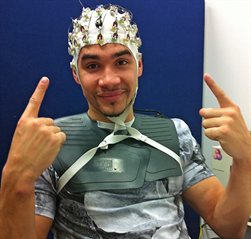Researchers investigate why some children grow out of ADHD
Academics from the Institute of Psychiatry at King’s College London appear on Channel 5 in a documentary about attention deficit hyperactivity disorder (ADHD), presented by Olympic gymnast Louis Smith.
In the documentary, Louis undergoes a series of tests including EEG, or electroencephalography (pictured), a non-invasive technique which measures brain activity using electrode sensors placed on the scalp.
 Researchers, led by Dr Jonna Kuntsi, are attempting to understand why a third of children with ADHD recover from the symptoms during adolescence, whereas about two-thirds of children continue to have symptoms as adults. Children and adolescents with ADHD are at higher risk of antisocial behaviour, substance abuse, depression and educational underachievement.
Researchers, led by Dr Jonna Kuntsi, are attempting to understand why a third of children with ADHD recover from the symptoms during adolescence, whereas about two-thirds of children continue to have symptoms as adults. Children and adolescents with ADHD are at higher risk of antisocial behaviour, substance abuse, depression and educational underachievement.
The researchers want to understand if, over time, children learn to compensate for the underlying impairments of brain function, and ultimately whether individuals with persistent ADHD could be trained in similar techniques.
By following over 100 individuals with childhood ADHD and their siblings, as well as 100 healthy control sibling pairs, the researchers aim to identify the underlying brain processes involved in persistence and remission of ADHD.
Dr Jonna Kuntsi, from the MRC Social, Genetic and Developmental Psychiatry (SGDP) Centre at the IoP at King’s and lead researcher on the project, says: “Our EEG data show that young people with ADHD have different patterns of some brain waves, compared to those without ADHD. By studying these differences, we hope to identify objective measures which could be used to direct the development of non-pharmacological interventions that reduce the negative long-term impact of ADHD.”
The study is one of two studies funded by children's charity, Action Medical Research. The second study, which is currently recruiting participants, involves similar tests, but is studying teenagers who were born premature. The research team are investigating why people who are born premature are more likely to develop attention and behavioural problems.
Dr Kuntsi adds: “We hope to boost understanding of how premature birth puts babies at increased risk of developing ADHD, by looking for changes within the brain in 150 adolescents who were born early. We are investigating whether the changes we find have anything in common with changes that we’ve already detected in adolescents with ADHD.”
Image copyright - Channel 5
If you are interested in taking part in the study, please contact Dr Jonna Kuntsi jonna.kuntsi@kcl.ac.uk